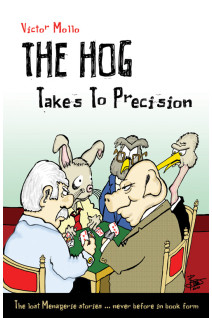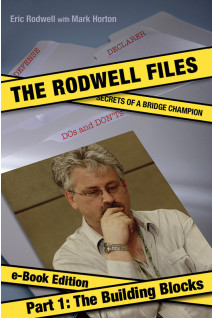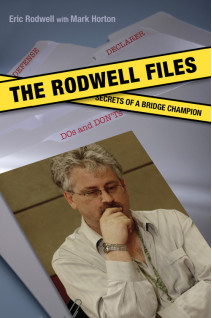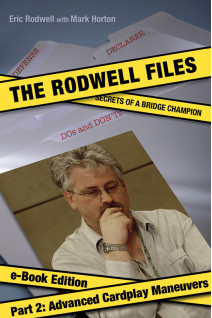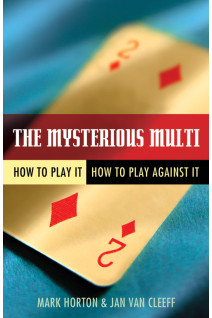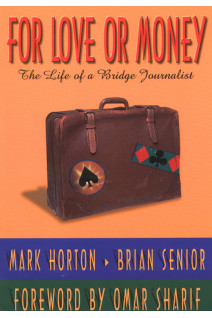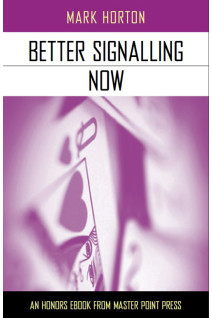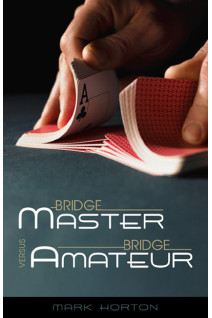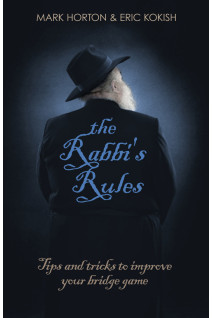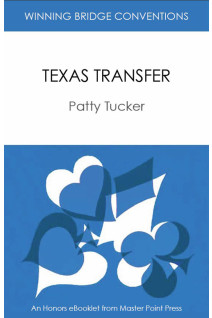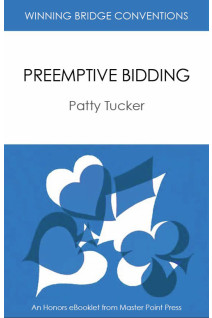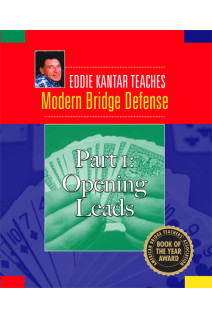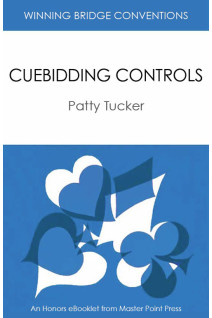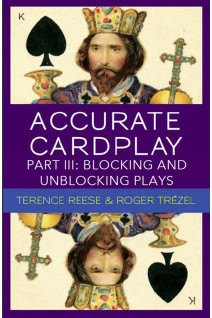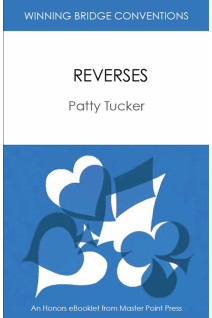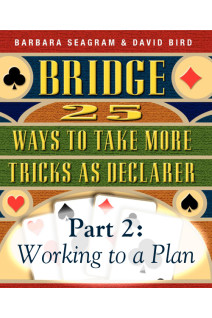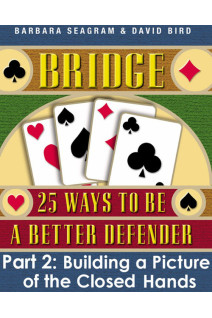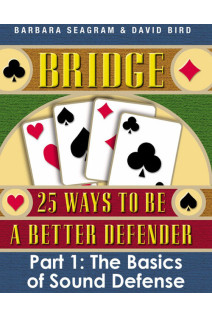- -20 %
The Rodwell Files, Part 3 of 4: Defensive Strategies
- Adobe .PDF
- .epub format (most e-Readers)
- .mobi format (for Kindle)
The Rodwell Files, Part 3 of 4: Defensive Strategies includes
Chapter 10: Reasons to Play Second Hand High
Passing the Freeze
Unblocking
Not Letting Them Slip a Trick Through
Before the Rats Get At It…
The Left Jab
Preventing a Cheap Finesse
Killing an Entry
Danger Hand High
Preserving Partner's Entry
Creating a Losing Option
Preventing an Opponent from Executing an Endplay Duck
The Intrapop
Appearing to Have Shortness
Countering a 4-4 Fit
Promoting a Trump
Protecting Partner's Honor(s)
Chapter 11: Reasons Not to Play Third Hand High
Futility
Preserving Communications
Tempting Declarer to Win and Leave Open Communications
Retaining a Major Tenace
Making a Withholding Play
Finessing against Dummy
Chapter 12: Reasons to (Abnormally) Play an Honor
Danger Hand High
Creating a Losing Option
You Want to Win a Trick from Your Side of the Table
Not Letting Them Slip Through a Ruffing Finesse
Preventing a Later Ruffing Finesse against Yourself
Pinning the Opposition in the Wrong Hand
Endplay Prevention Cover
Preventing a Goldman Trump Finesse
Chapter 13: Reasons for Ducking a Winner
Making a Holdup Play
Hoping Partner Can Win It
Waiting for Clarification
Creating a Guess in the Establishment of a Semi-solid Suit
Ducking to Create a Guess
Concealing the Position of a High Card
Capitalizing on Short-Short
Chapter 14: Reasons for Leading an Unsupported Honor
Leading a Pusher
Pinning a Card in a Short Suit
Waiting for a Signal
Planning a Follow-up
The Deschapelles Coup
The Merrimac Coup
Blocking a Suit
Gouging
Deceiving Declarer
Protecting Partner's Cards
Preventing a Ducking Play
Clarifying the Lead
Protecting Your High Card
Cashing Tricks in the Right Order
Chapter 15: Reasons for Leading into a Tenace
Setting Up a Force
Breaking Up the Entries for a Squeeze
Taking Out an Entry Prematurely
Pretending to Have a Singleton
Preserving Your Own Position
For the remaining volumes, look for the following titles:
The Rodwell Files, Part 1 of 4: The Building Blocks
The Rodwell Files, Part 2 of 4: Advanced Cardplay Maneuvers The Rodwell Files, Part 4 of 4: The DOs and DON'Ts of Cardplay
About the Book: Eric Rodwell's contributions to bidding theory are well-known, but in these ground-breaking books he reveals for the first time his unique approach to the play of the cards.
First, he describes and explains the process for deciding on a line of play — using concepts such as +L positions, tightropes, trick packages and Control Units as well as exploring more standard themes such as counting winners, losers, and distribution. Included here too is a checklist of 'defogging questions' to get you back on track when your analysis gets bogged down. Then he moves on to a host of innovative ideas in cardplay, strategies and tactics that can be used by declarer or defenders, each one illustrated with real-life examples from top-level play. Many of these ideas will be new to anyone below the bridge stratosphere. Finally, under the heading 'DOs and DON'Ts', Rodwell talks about the mental side of the game: areas where players often go wrong in their approach to the problem at hand, areas that mark the key differences between an average player and a successful one.
The original 'Rodwell File', the collection of notes on which these books are based, has been in existence for more than twenty years, but it is only now that the author is prepared to allow his 'secrets' to become public knowledge.
For the complete book see the following title:
The Rodwell Files: Secrets of a bridge champion
- Language: English
- Categories:
The Rodwell Files, Part 3 of 4: Defensive Strategies includes
Chapter 10: Reasons to Play Second Hand High
Passing the Freeze
Unblocking
Not Letting Them Slip a Trick Through
Before the Rats Get At It…
The Left Jab
Preventing a Cheap Finesse
Killing an Entry
Danger Hand High
Preserving Partner's Entry
Creating a Losing Option
Preventing an Opponent from Executing an Endplay Duck
The Intrapop
Appearing to Have Shortness
Countering a 4-4 Fit
Promoting a Trump
Protecting Partner's Honor(s)
Chapter 11: Reasons Not to Play Third Hand High
Futility
Preserving Communications
Tempting Declarer to Win and Leave Open Communications
Retaining a Major Tenace
Making a Withholding Play
Finessing against Dummy
Chapter 12: Reasons to (Abnormally) Play an Honor
Danger Hand High
Creating a Losing Option
You Want to Win a Trick from Your Side of the Table
Not Letting Them Slip Through a Ruffing Finesse
Preventing a Later Ruffing Finesse against Yourself
Pinning the Opposition in the Wrong Hand
Endplay Prevention Cover
Preventing a Goldman Trump Finesse
Chapter 13: Reasons for Ducking a Winner
Making a Holdup Play
Hoping Partner Can Win It
Waiting for Clarification
Creating a Guess in the Establishment of a Semi-solid Suit
Ducking to Create a Guess
Concealing the Position of a High Card
Capitalizing on Short-Short
Chapter 14: Reasons for Leading an Unsupported Honor
Leading a Pusher
Pinning a Card in a Short Suit
Waiting for a Signal
Planning a Follow-up
The Deschapelles Coup
The Merrimac Coup
Blocking a Suit
Gouging
Deceiving Declarer
Protecting Partner's Cards
Preventing a Ducking Play
Clarifying the Lead
Protecting Your High Card
Cashing Tricks in the Right Order
Chapter 15: Reasons for Leading into a Tenace
Setting Up a Force
Breaking Up the Entries for a Squeeze
Taking Out an Entry Prematurely
Pretending to Have a Singleton
Preserving Your Own Position
For the remaining volumes, look for the following titles:
The Rodwell Files, Part 1 of 4: The Building Blocks
The Rodwell Files, Part 2 of 4: Advanced Cardplay Maneuvers The Rodwell Files, Part 4 of 4: The DOs and DON'Ts of Cardplay
About the Book: Eric Rodwell's contributions to bidding theory are well-known, but in these ground-breaking books he reveals for the first time his unique approach to the play of the cards.
First, he describes and explains the process for deciding on a line of play — using concepts such as +L positions, tightropes, trick packages and Control Units as well as exploring more standard themes such as counting winners, losers, and distribution. Included here too is a checklist of 'defogging questions' to get you back on track when your analysis gets bogged down. Then he moves on to a host of innovative ideas in cardplay, strategies and tactics that can be used by declarer or defenders, each one illustrated with real-life examples from top-level play. Many of these ideas will be new to anyone below the bridge stratosphere. Finally, under the heading 'DOs and DON'Ts', Rodwell talks about the mental side of the game: areas where players often go wrong in their approach to the problem at hand, areas that mark the key differences between an average player and a successful one.
The original 'Rodwell File', the collection of notes on which these books are based, has been in existence for more than twenty years, but it is only now that the author is prepared to allow his 'secrets' to become public knowledge.
For the complete book see the following title:
The Rodwell Files: Secrets of a bridge champion
There are no reviews for this product yet
Be the first to write a review

 Swipe left
Swipe left


